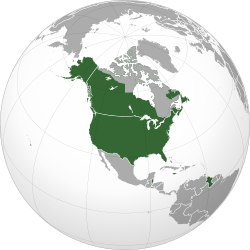آنگلو-آمریکایی - ویکیپدیا، دانشنامهٔ آزاد
 | |
| مناطق با جمعیت چشمگیر | |
|---|---|
| ۲۳۹٬۳۳۱٬۷۱۳ (۲۰۱۷) | |
| ۲۰٬۵۸۴٬۷۷۰ (۲۰۰۶) | |
| ۲٬۸۹۰٬۲۹۹ (۲۰۱۸) | |
| ۱٬۲۶۷٬۱۴۵ (۲۰۱۱) | |
| ۷۴۷٬۸۸۴ (۲۰۱۲) | |
| ۱۵۰٬۰۰۰ (۲۰۱۳) | |
| زبانها | |
| زبان انگلیسی (انگلیسی آمریکایی، انگلیسی کانادایی، Jamaican, Trinidadian, Guyanese, Belizean, Bajan, Bahamian, Vincentian, Grenadian, Anguillian, Montserrat, Antiguan and Barbudan, Saint Kittian and Nevisian, and Falkland Islands) | |
مردم آنگلو-آمریکایی (Anglo-Americans) یا آنگلو-آمریکنها به ساکنان انگلیسی زبان انگلیس و آمریکا گفته میشود. این اصطلاح بهطور معمول به کشورها و گروههای قومی آمریکایی اشاره دارد که زبان انگلیسی را به عنوان زبان مادری صحبت میکنند و نیز بیشتر افرادی که زبان انگلیسی را به عنوان زبان مادری به کار میبرند. این اصطلاح در طول جنگ مکزیک و آمریکا برای تمایز افراد انگلیسی زبان آمریکایی و افرادی که زبان اسپانیایی ساکن در غرب آمریکا به کار رفت.
کاربرد
[ویرایش]اصطلاح آنگلو-آمریکن یک اصطلاح مبهم است و به روشهای مختلفی مورد استفاده قرار میگیرد. در حالی که بهطور عمده برای اشاره به مردمان دارای ریشه بریتانیایی از اصطلاحاتی مانند آنگلو،، Anglic، Anglophone و Anglophonic استفاده میشود،[۱] آنگلوآمریکاییها برای اشاره به مردم آمریکای شمالی یا همه مردم دارای منشأ اروپایی که صرف نظر از نژاد و زبانشان در دنیای انگلیسی زبان مدرن زندگی میکنند اشاره میکند.[۲][۳] بنابراین، یک فرد، به عنوان مثال، از تبار چینی که فرهنگ آمریکایی یا کانادایی را تصویب میکند، انگلیسی زبان انگلیسی Anglo-American, Anglic, Anglophone, Anglo یا انگلیسی Anglophone را در بر میگیرد. مردم اسپانیایی زبان چینی که در آمریکا اسپانیایی زندگی میکنند، که «اسپانیایی» خواهند بود؛ بنابراین، آنگلو آمریکا، زبان انگلیسی، آمریکایی انگلیسی، آمریکا، انگلو یا انگلیسیون آمریکایی میتوانند به کسانی که خانواده هایشان بدون در نظر گرفتن نژاد و قومیت، در آمریکا، انگلیسی زبان، مناطق انگلیسی زبان کارائیب، بلیز و گایان، از جمله زبانهای آفریقایی. [نیازمند منبع]
جستارهای وابسته
[ویرایش]منابع
[ویرایش]- ↑ Oxford English Dictionary: "Anglo" بایگانیشده در ۲۹ اوت ۲۰۱۷ توسط Wayback Machine North American A white English-speaking person of British or northern European origin, in particular (in the US) as distinct from a Hispanic American or (in Canada) as distinct from a French-speaker.
- ↑ Mish, Frederic C. , Editor in Chief Webster's Tenth New Collegiate Dictionary Springfield, Massachusetts, U.S.A. :1994--Merriam-Webster See original definition (definition #1) of Anglo in English: It is defined as a synonym for Anglo-American--Page 86
- ↑ "Anglo – Definitions from Dictionary.com; American Heritage Dictionary". Lexico Publishing Group, LLC. Archived from the original on 15 March 2008. Retrieved 2008-03-29.
Usage Note: In contemporary American usage, Anglo is used primarily in direct contrast to Hispanic or Latino. In this context it is not limited to persons of English or even British descent, but can be generally applied to any non-Hispanic white person, making mother tongue (in this case English) the primary factor. Thus in parts of the United States such as the Southwest United States with large Hispanic populations, an American of Polish, Irish, or German heritage might be termed an Anglo just as readily as a person of English descent. However, in parts of the country where the Hispanic community is smaller or nonexistent, or in areas where ethnic distinctions among European groups remain strong, Anglo has little currency as a catch-all term for non-Hispanic whites. Anglo is also used in non-Hispanic contexts. In Canada, where its usage dates at least to 1800, the distinction is between persons of English and French descent. And in American historical contexts Anglo is apt to be used more strictly to refer to persons of English heritage, as in this passage describing the politics of nation-building in pre-Revolutionary America: "The 'unity' of the American people derived … from the ability and willingness of an Anglo elite to stamp its image on other peoples coming to this country" (Benjamin Schwarz).


 French
French Deutsch
Deutsch